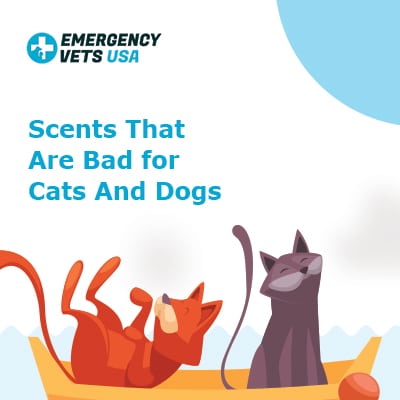Scents That Are Bad For Cats And Dogs
There are so many ways to make our homes smell wonderful these days.
Everything from plug-in and spray air fresheners to incense and oil diffusers.
Even though they smell great to us and help cover up odors that build up in the home, including pet odors, some of these scents are not necessarily good for the health of our pets.
Essential Oils & Oil Diffusers

Oil diffusers, while they give off a great fragrance, can have the potential to exasperate underlying respiratory problems in our dogs and cats.
If your cat or dog already has asthma or another breathing problem, it is best to avoid oil diffusers.
If your pet has never had respiratory problems, it may be okay to use an oil diffuser in the home, but make sure to keep it out of reach of your pet.
It is also a good idea to either use it in a room where your pet will not have access to it, or keep windows open and maintain good ventilation.
Our pets can be very sensitive to things we often take for granted ourselves.
Essential oils can be toxic to cats.
Not only can they cause irritation in their respiratory tract when inhaled, but they can cause more serious systemic problems as well, including liver failure.
Cats do not have the correct enzymes within their liver to break down chemicals within certain essential oils.
These essential oils can cause problems with cats whether they are ingested or absorbed across their skin.
Essential oils to avoid if you have a cat, according to the Pet Poison Helpline[1]:
- Oil of wintergreen
- Oil of sweet birch
- Citrus oil
- Pine oils
- Peppermint oil
- Ylang Ylang oil
- Cinnamon oil
- Pennyroyal oil
- Clove oil
- Eucalyptus oil
- Tea tree oil
Even if you try to keep oil diffusers with essential oils in a secure location you think your cat is unable to get to, think again.
Cats are incredible at finding things they are curious about.
Most cats are also quite agile and can jump to high places without much support.
Cats do not have to ingest the oils or come into direct physical contact with them to get sick.
Cats can absorb the diffused oils that are in the air across their skin.
Additionally, since cats are avid groomers, they will easily ingest droplets as they accumulate on their fur.
Symptoms of essential oil toxicity in cats include:
- Drooling
- Vomiting
- Tremors
- Wobbliness (being off balance)
- Low heart rate
- Low body temperature
If you think there is a chance your cat may have come into contact with essentials oils, whether from an oil diffuser or in another form, take them to your vet’s office right away.
If you are unable to get them to your vet, call them and see if they recommend you give your cat a bath.
Sometimes the best thing you can do at home is get as many of the toxic substances off of your cat as possible to stop any further absorption.
Is Incense Safe For Cats?
Even though incense can be relaxing for us, it is not safe for cats.
Cats are very sensitive to smoke. Burning incense in the home could cause your cat to have upper respiratory symptoms, such as sneezing, congestion, and watery eyes.
If your cat already has an underlying respiratory illness the incense can cause it to flare-up or even get worse.
Burning incense could also trigger asthma to develop in your cat. If you notice your cat coughing, stop burning the incense right away.
Is Incense Bad For Cats?
Based on information we know about cats’ sensitive airways, yes, incense is bad for cats.
If you have a cat, it is best to be on the safe side and not burn incense in your home.
If you absolutely need to burn incense, take these safety steps to lower the risk your cat may develop breathing problems:
- Burn the incense in a single room that your cat does not have access to
- Open windows
- Maintain adequate ventilation
- Keep the incense tightly secured where your cat cannot play with it or knock it over
Is Incense Bad For Dogs?
Just like with cats, dogs can also be sensitive to the smoke and scents that comes from burning incense.
Dogs with pre-existing respiratory issues and brachycephalic breeds (pugs, bulldogs, shih tzus, “smoosh faced” dogs) are more at risk.
If you do decide to burn incense, pay close attention to your dog.
If you notice them starting to have a runny nose or runny eyes, or their breathing becomes more heavy, stop burning the incense right away.
It is always a good idea to check with your dog’s vet as well.
If they are concerned and advise against it, it is best to just avoid incense altogether.
Scented Candles
Scented candles, while not directly toxic to our pets, still have the potential to cause problems.
Some cats and dogs may be sensitive to the smells and smoke given off by scented candles.
Other pets that have underlying respiratory issues, could have a flare up of their symptoms if candles are used in the home.
This is especially true for cats with asthma. If your cat has asthma and you notice them starting to cough more and have more frequent flare-ups when you have candles lit, it is time to get rid of the candles.
Symptoms your cat or dog may show if they are sensitive to candles:
- Sneezing
- Watery eyes
- Runny nose
- Itchy skin
- Coughing
If you must light a candle, make sure it is either in a room where your pet does not have access to, or you maintain adequate ventilation in the home.
Always make sure to keep the candle out of reach of your pet.
Do not put it anywhere that your pet could possibly knock it over. Candles always have the potential to be fire hazards, especially in a home with pets.
Air Fresheners
While air fresheners do not put out smoke and may seem to be less irritating, some cats and dogs could still be sensitive to them.
These are definitely a safer alternative to scented candles. However, you need to pay close attention to your pet before and after you use an air freshener.
If you notice more sneezing, coughing, water eyes, and runny noses in your pets after you use either a plug-in or spray air freshener, your pet may be sensitive to them.
Every pet is different, and while some may be able to handle anything you change in their home, others may struggle to breath.
Sources:
[1] https://www.petpoisonhelpline.com/blog/essential-oils-cats

Leslie Brooks graduated from the University of Tennessee College of Veterinary Medicine in 2012. After graduation she moved to Indianapolis to do an intensive one-year internship at a specialty practice and then began working as a small animal general practitioner. She ran her own house call practice for three years, visiting pets in people’s homes. Currently, she works part time in clinical practice and volunteering her free time to serve pets of the homeless. Read more about us here.

Thank you very much. I don’t light a lot a candles and if I do it’s usually lavender or vanilla. I have just bought a Maine Coon kitten and my husband was reading an article on incense and the damage it can do. No more scented candles or incense.
My husband burns incense almost every day. We have two small dogs and lately one of them has been throwing up and he seems to sleep more. The other dog sneezes a lot. Could the incense be causing there symptoms?
Hi Bridget, sounds like this could be the cause of your dog sneezing. The only way to know is to stop burning incense for a few weeks and see if their symptoms clear up. If not, there could be other factors at play within your home.